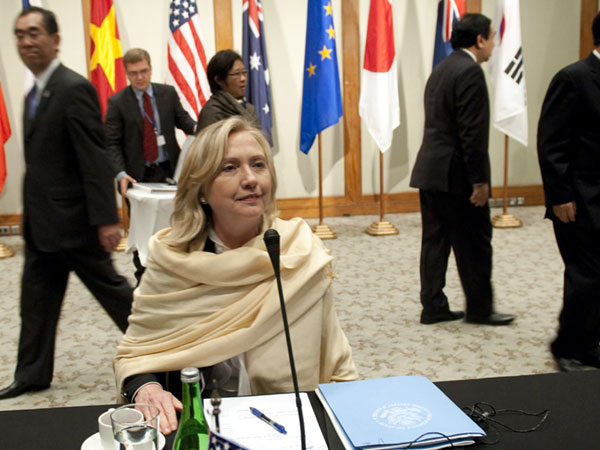
US Secretary of State Hillary Rodham Clinton speaks at a meeting of the Friends of the Lower Mekong during the Association of Southeast Asian Nations and the East Asia Summit in Nusa Dua, Bali Indonesia, Friday. AP
BALI, Indonesia—Myanmar will not win the trust of the international community until it releases political prisoners and opens dialogue with the opposition, US Secretary of State Hillary Rodham Clinton said Friday, appealing to the country’s neighbors to help push for democratic reforms.
She also called on the military-dominated government to address growing concerns about weapons proliferation.
Myanmar held elections late last year, officially handing power to a civilian administration after a half-century of military rule and releasing pro-democracy leader Aung San Suu Kyi from house arrest.
At the urging of the 10-member Association of Southeast Asian Nations, the Obama administration sought to engage Myanmar to improve conditions, but with little affect and there are no plans to ease sanctions.
Clinton appealed to Asean to help persuade Myanmar to push for democratic reforms.
“We look to the government to unconditionally release the more than 2,000 political prisoners who continue to languish in prison,” she said, adding the country’s rulers should also conduct meaningful and inclusive dialogue with the political opposition and ethnic minorities.
“The choice is clear,” she said. “They can take these steps and gain back the confidence of their people and the trust of the international community. Or they can continue down the path they’ve been on.”
Last year, US officials said a North Korean ship, suspected of carrying weapons or missile heads, was intercepted as it headed to Myanmar, raising fears the country has nuclear ambitions.
Clinton called on the government to “respect and adhere to relevant UN Security Council Resolutions.”
Myanmar came under military rule in 1962 and has brutally suppressed political dissent since then. Suu Kyi’s National League for Democracy swept 1990 elections but was barred from taking power.
A senior US official, speaking to reporters on condition he not be named, noted the recent change in leadership had at least opened the hope of dialogue.
He said the former regime, headed by Gen. Than Shwe, was the most difficult diplomatically he ever dealt with “by far, with any country at any time,” including North Korea.


